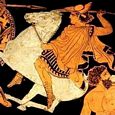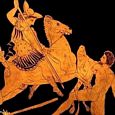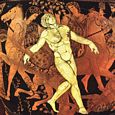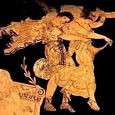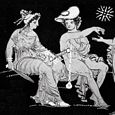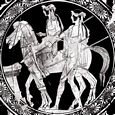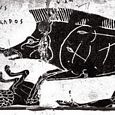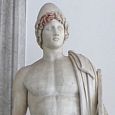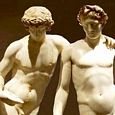DIOSKOUROI
Greek Name
Διοσκουρος Διοσκουροι
Transliteration
Dioskouros, Dioskouroi
Latin Spelling
Dioscurus, Dioscuri
Translation
Boys of Zeus (kouros dios)
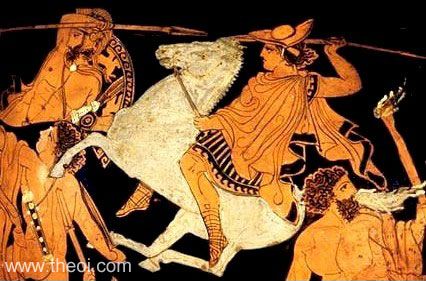
THE DIOSKOUROI (Dioscuri) were the star-crowned, twin gods of St. Elmo's fire--an electrical discharge which appears on the rigging of ships portending deliverance from a storm. They were also gods of horsemanship and protectors of guests and travellers.
The twins were born as mortal princes, sons of the Spartan queen Leda by Zeus and her husband Tyndareus. Because of their kindness and generosity they were apotheosised at death. Polydeukes (Polydeuces), being a son of Zeus, was at first the only one offered this gift but he insisted it be shared with his twin Kastor (Castor). Zeus agreed, but in order to appease the Fates, the twins had to spend alternate days in heaven and the underworld.
The Dioskouroi were also placed amongst the stars as the constellation Gemini (the Twins). The division of their time between heaven and the underworld might be a reference to the heavenly cycles--for their constellation is visible in the sky for only six months of the year.
The Dioskouroi were depicted as youthful horsemen with wide-brimmed traveller's hats.
FAMILY OF THE DIOSCURI
PARENTS
[1.1] ZEUS & LEDA (both Kastor & Polydeukes) (Hesiod Catalogues of Women Frag 66, Homeric Hymn 32, Alcaeus Frag 34, Terpander Frag 5,
Hyginus Fabulae 14, and other sources)
[1.2] ZEUS & LEDA (for Polydeukes), TYNDAREUS & LEDA (for Kastor)
(Pindar Nemean Ode 10, Hyginus Fabulae 77 & 80, and other sources)
NAMES
[1.1] KASTOR, POLYDEUKES (Many references)
OFFSPRING OF POLYDEUKES
[1.1] MNESILEOS (by Phoibe) (Apollodorus
3.134)
[1.2] MNASINOUS (by Phoibe) (Pausanais
2.22.5)
OFFSPRING OF KASTOR
[1.1] ANOGON (by Hilaeira) (Apollodorus
3.134)
[1.2] ANAXIS (by Hilaeira) (Pausanais
2.22.5)
NAMES OF THE DIOSCURI
Greek Name
Τυνδαριδαι
Καστωρ
Πολυδευκης
Transliteration
Tyndaridai
Kastor
Polydeukes
Latin Spelling
Tyndaridae
Castor
Polydeuces, Pollux
Translation
Sons of Tyndareus
Beaver? (kastôr)
Sweets? (deukos)
CLASSICAL LITERATURE QUOTES
PARENTAGE OF THE DIOSCURI
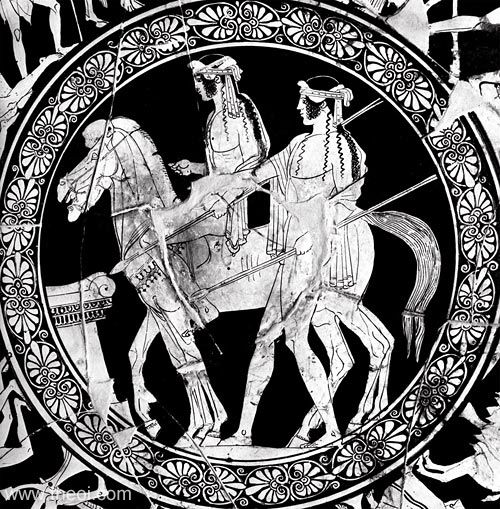
Hesiod, Catalogues of Women Fragment 66 (from Scholiast on Pindar Nem. x. 150)
(trans. Evelyn-White) (Greek epic C8th or 7th B.C.) :
"Hesiod in giving their descent makes them [Kastor (Castor) and Polydeukes (Polydeuces)] both sons of
Zeus."
Pseudo-Hyginus, Fabulae 14 (trans. Grant) (Roman mythographer C2nd A.D.) :
"Castor and Pollux [Polydeukes (Polydeuces)], sons of Jove [Zeus] and Leda, daughter of Thestius."
Pseudo-Hyginus, Fabulae 77 :
"Jupiter [Zeus], changed into a swan, had intercourse with Leda near the river Eurotas, and from that
embrace she bore Pollux [Polydeukes] and Helen; to Tyndareus she bore Castor and Clytemnestra."
Pseudo-Hyginus, Fabulae 155 :
"Sons of Jove [Zeus] . . . Castor and Pollux [Polydeukes] by Leda, daughter of Thestius."
MORTAL LIFE OF THE DIOSCURI
The mortal lives of the Dioskouroi are not detailed here. Their many adventures included taking part in the Voyage of the Argonauts and the Calydonian Boar Hunt. They also laid siege to Athens when their sister Helene was kidnapped by Theseus. The twins died and were granted immortality shortly after Helene absconded to Troy with Paris and so they did not participate in the Trojan War.
DEATH & APOTHEOSIS OF THE DIOSCURI
Stasinus of Cyprus or Hegesias of Aegina, Cypria Fragment 1 (from Proclus,
Chrestomathy i) (trans. Evelyn-White) (Greek epic C7th or 6th B.C.) :
"Kastor (Castor) and Polydeukous (Polydeuces), while stealing the cattle of Idas and Lynkeus (Lynceus),
were caught in the act, and Kastor was killed by Idas, and Lynkeus and Idas by Polydeukes. Zeus gave them
immortality every other day."
Stasinus of Cyprus or Hegesias of Aegina, Cypria Fragment 7 (from Clement of
Alexandria, Protrept 2.30.5) :
"Kastor (Castor) was mortal, and the fate of death was destined for him; but Polydeukes (Polydeuces), scion
of Ares was immortal."
Pindar, Pythian Ode 11 ep4 (trans. Conway) (Greek lyric C5th B.C.) :
"The might of Kastor (Castor), and your fame O royal Polydeukes (Polydeuces); you twin sons divine, who
live today within Therapnai's (Therapnae's) dwellings [the burial place of the brothers], tomorrow in the halls
of high Olympos."
Pindar, Nemean Ode 10 ep3 - ep5 :
"The two brothers [the Dioskouroi (Dioscuri)], at the games of Sparta's wide-built city, joint patrons with
Hermes and with Herakles the presidency share. And due regard have they for men of justice. Truly the gods are
faithful friends. Now, each alternate day they change their dwelling, one day beside Zeus, their beloved father;
then in the valley of Therapnai (Therapnae) within the earth's deep folds, these brothers share their common
destiny [i.e. a grave at Therapnai]; for so, rather than be for ever a god and dwell in heaven, Polydeukes
(Polydeuces) chose for both this twofold life, when Kastor (Castor) fell, laid low in combat. For Idas, in hot
anger for the cattle stolen from him with his bronze-pointed spear dealt him a grievous wound . . . and Zeus
upon Idas launched his fire-wrought consuming bolt, and the two burned together, friendless, upon one pyre. Hard
is it for men to strive against a mightier power.
Then swiftly ran the son of Tyndareus back to his warrior brother, and he found him still living, but within his
throat death's rattle sounded. Then with hot tears streaming and bitter groans, he cried aloud : ‘O
Father, son of Kronos (Cronus) [Zeus], what release shall there be from sorrows? Grant that I too with my
brother may die, great king, I beg thee. For glory is departed from a man robbed of his friends, and under
stress of toils few mortals will abide faithful companions to share in the labour.’
He ended, and Zeus came and stood before him and spoke these words : ‘Thou are my son; but after in thy
mother's womb was set the mortal seed of this thy brother, sprung from her hero husband. But see then, none the
less this choice I will give thee: if freed from death and the harsh years of age, it is thy will to dwell
beside my throne upon Olympos, companion to Athene and to Ares, god of the shadowing spear, this choice is thine
to take. But if, in thy heart's travail for thy brother, thou art in mind to share all things alike with him,
then half thy days shalt thou beneath the earth draw breath, and half within the golden citadels of
heaven.’
He spoke, and Polydeukes had no thought but for the single choice; and Zeus made fee the eye, and then the voice
of Kastor of the brazen circlet."
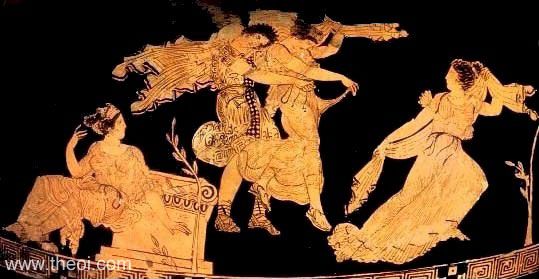
Alcman, Fragment 2 (trans. Campbell, Vol. Greek Lyric II) (C7th B.C.) :
"Most worthy of reverence from all gods and men, they dwell in a god-built home beneath the earth always
alive, Kastor (Castor)--tamer of swift steeds, skilled horsemen--and glorious Polydeukes (Polydeuces)."
Pseudo-Apollodorus, Bibliotheca 3. 136 - 137 (trans. Aldrich) (Greek mythographer
C2nd A.D.) :
"They [the Dioskouroi (Dioscuri)] prepared to waylay Idas and Lynkeus (Lynceus), but Lynkeus saw Kastor
(Castor) and pointed him out to Ias, who killed him. Polydeukes (Polydeuces) set out after them and killed
Lynkeus with his spear, but as he was chasing Idas, a rock thrown by the other hit him and he fell down dazed.
Zeus struck Idas with a thunderbolt, and took Polydeukes up to the sky. But because Polydeukes would not accept
immortality while Kastor was a corpse, Zeus granted them alternating days among the gods and among
mortals."
Lycophron, Alexandra 564 ff (trans. Mair) (Greek poet C3rd B.C.) :
"An the one pair [the Dioskouroi (Dioscuri)] Hades shall receive : the others the meadows of Olympos shall
welcome as guests on every alternate day, brothers of mutual love, undying and dead."
Pausanias, Description of Greece 8. 2. 4 (trans. Jones) (Greek travelogue C2nd A.D.)
:
"In those days [the age of heroes] men were changed to gods, who down to the present day have honours paid
to them--Aristaios (Aristaeus), Britomartis of Krete (Crete), Herakles the son of Alkmene (Alcmena), Amphiaraus
the son of Oikles (Oecles), and besides these Polydeukes (Polydeuces) and Kastor (Castor)."
Diodorus Siculus, Library of History 4. 48. 6 (trans. Oldfather) (Greek historian
C1st B.C.) :
"The god [Triton] accompanied the ship [of the Argonauts with which the Dioskouroi (Dioscuri) sailed as
young men] in its voyage without ceasing for two days and nights and foretold to Herakles his Labours and
immortality, and to the Tyndaridai (Tyndaridae) that they should be called Dioskoroi (Dioscuri) [i.e. Sons of
Zeus] and receive at the hands of all mankind honour like that offered to the gods."
Diodorus Siculus, Library of History Book 6 Fragment 6 :
"According to tradition, Kastor (Castor) and Polydeukes (Polydeuces), who were also known as the Dioskouroi
(Dioscuri), far surpassed all other men in valour and gained the greatest distinction in the campaign in which
they took part with the Argonauts; and they have come to the aid of many who have stood in need of succour. And,
speaking generally, their manly spirits and skill as generals, and their justice and piety as well, have won
them fame among practically all men, since they make their appearance as helpers of those who fall into
unexpected perils [that is, they appear to mariners in storms]. Moreover, because of their exceptional valour
they have been judged to be sons of Zeus, and when they departed from among mankind they attained to immortal
honours."
Aelian, Historical Miscellany 13. 38 (trans. Wilson) (Greek rhetorician C2nd to 3rd
A.D.) :
"They say he [Alkibiades] used to describe his career as the life of the Dioskouroi (Dioscuri), alive and
dead on alternate days. If he was successful the public treated him as a god; if he failed, he was no better
than a dead man."
Pseudo-Hyginus, Fabulae 80 (trans. Grant) (Roman mythographer C2nd A.D.) :
"Castor killed Lynceus in battle; Idas, at his brother's death, forgot both strife and bride, and started
to bury his brother. When he was placing the bones in a funeral monument, Castor intervened, and tired to
prevent his raising the monument, because he had won over him as if he were a woman. In anger, Idas pierced the
thigh of Castor with the sword he wore. Others say that as he was building the monument he pushed it on Castor
and thus killed him. When they reported this to Pollux [Polydeukes (Polydeuces)], he rushed up and overcame Idas
in a single fight, recovered the body of his brother, and buried it. Since, however, he himself had received a
star from Jove [Zeus], and one was not given to his brother, because Jove said that Castor and Clytemnestra were
of the seed of Tyndareus, while he and Helen were children of Jove, Pollux begged that he be allowed to share
his honor with his brother. This was granted him."
Pseudo-Hyginus, Fabulae 224 :
"Mortals who were made immortal . . . Castor and Pollux [Polydeukes], brothers of Helen, sons of Jove
[Zeus] and Leda."
Pseudo-Hyginus, Fabulae 251 :
"Those sho, by permission of the Parcae [Moirai], returned from the lower world . . . Castor and Pollux
[Polydeukes], sons of Jove [Zeus] and Leda, return in alternate death."
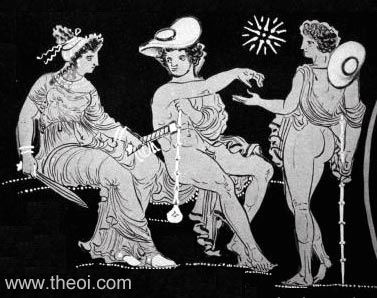
Pseudo-Hyginus, Astronomica 2. 22 :
"[Constellation Gemini] Twins. These stars many astronomers have called Castor and Pollux [Polydeukes].
They say that of all brothers they were the most affectionate, not striving in rivalry for the leadership, nor
acting without previous consultation. As a reward for their services of friendship, Jupiter [Zeus] is thought to
have put them in the sky as well-known stars. Neptunus [Poseidon], with like intention, has rewarded them for he
gave them horses to ride, and power to aid shipwrecked men . . . Those who speak of Castor and Pollux add this
information, that Castor was slain in the town of Aphidnae, at the time when the Lacedaemonians were fighting
the Athenians. Others say that when Lynceus and Idas were attacking Sparta, he perished there. Homer states that
Pollux granted to his brother one half of his life, so that they shine on alternate days."
Ovid, Fasti 5. 697 ff (trans.Boyle) (Roman poetry C1st B.C. to C1st A.D.)
:
"[Constellation Gemini.] ‘Tell me the cause of this star sign.’ The god's [Apollon's] eloquent
lips supplied the cause : ‘The Tyndarid brothers [the Dioskouroi (Dioscuri)], the horseman and the boxer,
had raped and kidnapped Phoebe and her sister [the Leukippide (Leucippides)]. Idas and his brother go to war for
their women, to whom they were betrothed by Leucippus. Love drives one group to recover, one to refuse; the
identical cause makes each pair fight. The Oebalids could have outrun their pursuers, but it seemed base to win
on rapid flight. There is a treeless place, a spot fit for battle. They took their stand there: it's name
Aphidna. Castor was stabbed in the chest by Lynceus' sword, and hit the ground wounded and surprised. The
avenger Pollux [Polydeukes] is there and spears Lynceus where the neck joins and presses the shoulders. Idas
attacked and was barely routed by Jove's [Zeus'] fire; but they deny the lightning disarmed him. The sublime
heaven already opened for you, Pollux, when you said: "Hear my words, father. Divide between two the heaven
reserved for me. Half of the gift will exceed the whole." He spoke and ransomed his brother by rotating
positions. Both stars assist troubled ships.’"
Ovid, Heroides 16. 327 ff (trans. Showerman) (Roman poetry C1st B.C. to C1st A.D.)
:
"[Paris addresses Helene :] ‘I will imitate the deed of Aegeus' son [Theseus] and of your brothers
[the Dioscouroi (Dioscuri)]. You can be touched by no examples nearer than these. Theseus stole you away, and
they the twin Leucippides; I shall be counted fourth among such examples.’"
Cicero, De Natura Deorum 2. 24 (trans. Rackham) (Roman rhetorician C1st B.C.)
:
"Human experience moreover and general custom have made it a practise to confer the deification of renown
and gratitude upon distinguished benefactors. This is the origin of Hercules [Herakles], of Castor and Pollux
[the Dioskouroi (Dioscuri)], of Aesculapius [Asklepios] . . . And these benefactors were duly deemed divine, as
being both supremely good and immortal, because their souls survived and enjoyed eternal life."
Cicero, De Natura Deorum 3. 15 :
"In Greece they worship a number of deified human beings, Alabandus at Alabanda, Tennes at Tenedos,
Leucothea, formerly Ino, and her son Palaemon throughout the whole of Greece, as also Hercules [Herakles],
Aesculapius [Asklepios], the sons of Tyndareus [Dioskouroi (Dioscuri)]."
Cicero, De Natura Deorum 3. 18 :
"If you call Apollo, Vulcanus [Hephaistos], Mercurius [Hermes] and the rest gods, will you have doubts
about Hercules [Herakles], Aesculapius [Asklepios], Liber [Dionysos], Castor and Pollux [the Dioskouroi
(Dioscuri)]? But these are worshipped just as much as those, and indeed in some places very much more than they.
Are we then to deem these gods, the sons of mortal mothers?"
DIOSCURI & THE CONSTELLATION GEMINI
Pseudo-Hyginus, Astronomica 2. 22 (trans. Grant) (Roman mythographer C2nd A.D.)
:
"[Constellation Gemini] The Twins. These stars many astronomers have called Castor and Pollux [Polydeukes].
They say that of all brothers they were the most affectionate, not striving in rivalry for the leadership, nor
acting without previous consultation. As a reward for their services of friendship, Jupiter [Zeus] is thought to
have put them in the sky as well-known stars . . . Homer states that Pollux granted to his brother one half of
his life, so that they shine on alternate days."
Ovid, Metamorphoses 8. 370 ff (trans. Melville) (Roman epic C1st B.C. to C1st A.D.)
:
"Now [in the hunt for the Calydonian Boar] the Gemini (the Twins) [Dioskouroi (Dioscuri)], not stars of
heaven as yet, came cantering up, both brothers striking, both on snow-white steeds; and both poised quivering
spears with flashing points."
Ovid, Fasti 5. 697 ff (trans.Boyle) (Roman poetry C1st B.C. to C1st A.D.)
:
"[Constellation Gemini] ‘Tell me the cause of this star sign.’ The god's [Apollon's] eloquent
lips supplied the cause: ‘The Tyndarid brothers [the Dioskouroi (Dioscuri)], the horseman and the boxer,
had raped and kidnapped Phoebe and her sister [the Leucippides]. Idas and his brother go to war for their women
[and in the process Kastor (Castor) is killed] . . . The sublime heaven already opened for you, Pollux
[Polydeukes], when you said : "Hear my words, father [Zeus]. Divide between two the heaven reserved for me.
Half of the gift will exceed the whole." He spoke and ransomed his brother by rotating positions. Both
stars assist troubled ships.’"
Seneca, Hercules Furens 4 ff (trans. Miller) (Roman tragedy C1st A.D.) :
"[Hera complains :] ‘I must dwell on earth, for harlots hold the sky [in the form of constellations]
. . . [and Zeus' bastard sons] here Orion with threatening sword terrifies the gods, and golden Perseus has his
stars; the bright constellation [Gemini] of the twin Tyndaridae [Dioskouroi (Dioscuri)] shines
yonder.’"
GODS OF ST-ELMO'S FIRE & PROTECTORS OF SAILORS
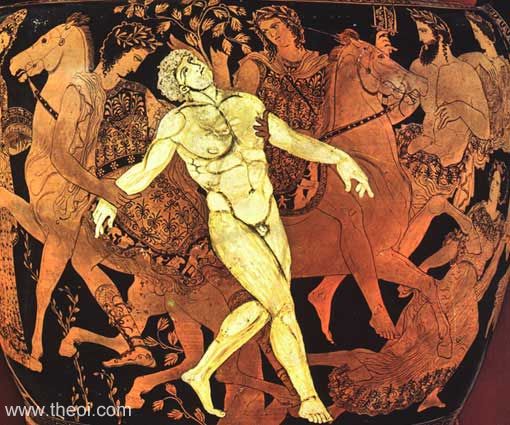
The Dioskouroi appeared to sailors during storms in the guise of St. Elmo's fire--an electrical discharge which creates a glow about the mast-head and rigging of ships.
Homeric Hymn 27 to the Dioscuri (trans. Evelyn-White) (Greek epic C7th to 4th B.C.)
:
"[The Dioskouroi (Dioscuri)] are deliverers of men on earth and of swift-going ships when stormy gales rage
over the ruthless sea. Then the shipmen call upon the sons of great Zeus with vows of white lambs, going to the
forepart of the prow; but the strong wind and the waves of the sea lay the ship under water, until suddenly
these two are seen darting through the air on tawny wings [i.e. in the form of St Elmo's fire]. Forthwith they
allay the blasts of the cruel winds nad still the waves upon the surface of the white sea: fair signs are they
and deliverance from toil. And when the shipmen see them they are glad and have rest from their pain and
labour."
Alcaeus, Fragment 34 (trans. Campbell, Vol. Greek Lyric I) (Greek lyric C6th B.C.)
:
"Come hither, leaving the island of Pelops [the Peloponnese], strong sons of Zeus and Leda; appear with
kindly heart, Kastor (Castor) and Polydeukes (Polydeuces), who go on swift horses over the broad earth and all
the sea, and easily resue men from chilling death, leaping on the peaks of their well-benched ships, brilliant
from afar as you run up the fore-stays [i.e. St. Elmo's fire], bringing light to the black ship in the night of
trouble."
Terpander, Fragment 5 (trans. Campbell, Vol. Greek Lyric II) (C7th B.C.) :
"[The Dioskouroi (Dioscuri)] sons of Zeus and Leda, you handsome saviours."
Plato, Euthydemus 293a (trans. Lamb) (Greek philosopher C4th B.C.) :
"As though I were calling upon the Dioskouroi (Dioscuri) to save us, the lad and myself, from the mighty
wave [literally ‘the big wave that comes in every three’]."
Diodorus Siculus, Library of History 4. 43. 1 (trans. Oldfather) (Greek historian
C1st B.C.) :
"[During the voyage of the Argonauts :] There came on a great storm and the chieftains had given up hope of
being saved, when Orpheus, they say, who was the only one on ship-board who had ever been initiated in the
Mysteries of the deities of Samothrake [the Kabeiroi (Cabeiri)], offered to these deities prayers for their
salvation. And immediately the wind died down and two stars fell over the heads of the Dioskouroi (Dioscuri),
and the whole company was amazed at the marvel which had taken place and concluded that they had been rescued
from their perils by an act of providence of the gods. For this reason, the story of this reversal of fortune
for the Argonauts has been handed down to succeeding generations, and sailors when caught in storms always
direct their prayers to the deities of Samothrake and attribute the appearance of the two stars to the epiphany
of the Dioskouroi."
Diodorus Siculus, Library of History Book 6 Fragment 6 :
"They [the Dioskouroi (Dioscuri)] make their appearance as helpers of those who fall into unexpected perils
[i.e. they appear to mariners in storms]."
Diodorus Siculus, Library of History Book 6 Fragment 6 :
"They [the Dioskouroi (Dioscuri)] have come to the aid of many who have stood in need of succour. And,
speaking generally, their manly spirits and skill as generals, and their justice and piety as well, have won
them fame among practically all men, since they make their appearance as helpers of those who fall into
unexpected perils [i.e. appearing to mariners during storms]."
Plutarch, Life of Theseus 33. 1 (trans. Perrin) (Greek historian C1st to C2nd A.D.)
:
"There are also those who say that the Tyndaridai [Dioskouroi] were called ‘Anakes’ because of
the appearance of their twin stars in the heavens, since the Athenians use anekas and
anekathen for ano and anothen, signifying ‘above’ or ‘on
high’."
Plutarch, Life of Lysander 12. 1 :
"There were some who declared that the Dioskouroi (Dioscuri) appeared as twin stars on either side of
Lysander's [an historical Athenian statesman] ship just as he was sailing out of the harbor against the enemy,
and shone out over the rudder-sweeps."
Aelian, Historical Miscellany 1. 30 (trans. Wilson) (Greek rhetorician C2nd to 3rd
A.D.) :
"Let us be . . . like Dioskouroi (Dioscuri) to the poor wretches, ‘saviours and benevolent
guardians,’ as those gods are commonly described."
Pseudo-Hyginus, Fabulae 14 (trans. Grant) (Roman mythographer C2nd A.D.) :
"Castor and Pollux [Polydeukes], sons of Jove [Zeus] and Leda, daughter of Thestius . . . both beardless
youths. It is written that at the same time stars appeared on their heads, seeming to have fallen there."
Pseudo-Hyginus, Astronomica 2. 22 :
"As a reward for their [the Dioskouroi's (Dioscuri's)] services of friendship, Jupiter [Zeus] is thought to
have put them in the sky as well-known stars [constellation Gemini]. Neptunus [Poseidon], with like intention,
has rewarded them for he gave them horses to ride, and power to aid shipwrecked men."
Propertius, Elegies 2. 26A (trans. Goold) (Roman elegy C1st B.C.) :
"How I feared lest the sea perchance should take you name and mariners sailing your waters should weep for
you. What vows did I then make to Neptunus [Poseidon], to Castor and his brother [the Dioskouroi (Dioscuri)],
and to you, Leucothoe, a goddess now!"
Valerius Flaccus, Argonautica 5. 366 ff (trans. Mozley) (Roman epic C1st A.D.)
:
"The sons of Tyndareus [the Dioskouroi (Dioscuri) amongst the Argonauts] with star-illuminated hair."
Statius, Silvae 3. 2. 1 (trans. Mozley) (Roman poetry C1st A.D.) :
"Bring forth your favouring stars, Oebalian brethren [the Dioskouroi (Dioscuri)], and sit upon the twin
horns of the yard-arm [i.e. in the form of St. Elmo's fire]; let your light illumine sea and sky; drive far
away, I pray your Ilian sister's tempestuous star [the star of Helene was considered dangerous to ships], and
banish her wholly from the heavens."
Seneca, Hercules Furens 552 (trans. Miller) (Roman tragedy C1st A.D.) :
"The stars of the twin Tyndaridae [Dioskouroi (Dioscuri)] come ... to the aid of timorous ships."
Nonnus, Dionysiaca 28. 255 ff (trans. Rouse) (Greek epic C5th A.D.) :
"Polydeukes (Polydeuces) brings calm to buffeted ships when he puts to sleep the heavy billows of the
galebreeding sea."
GODS OF HORSEMANSHIP & PROTECTORS OF GUESTS
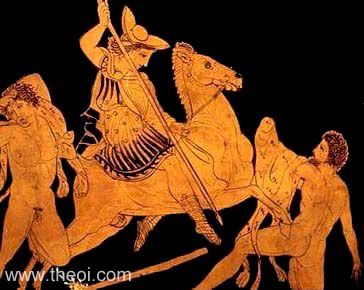
Alcman, Fragment 2 (trans. Campbell, Vol. Greek Lyric II) (C7th B.C.) :
"Most worthy of reverence from all gods and men, they dwell in a god-built home beneath the earth always
alive, Kastor (Castor)--tamer of swift steeds, skilled horsemen--and glorious Polydeukes (Polydeuces)."
Callimachus, Lyric Frag 227 (trans. Trypanis) (Greek poet C3rd B.C.) :
"O Kastor (Castor), and you, Polydeukes (Polydeuces), tamers of horses, protectors of the homeless and
guides of the guests."
PATRON GODS OF THE OLYMPIC GAMES
Pindar, Olympian Ode 3 (trans. Conway) (Greek lyric C5th B.C.) :
"For to these [the Dioskouroi (Dioscuri)] he [Herakles] gave, when he departed to high Olympos, to preside
over the glorious contest [the Olympian Games]."
Pindar, Nemean Ode 10 ep3 :
"The two brothers [the Dioskouroi (Dioscuri)], at the games of Sparta's wide-built city, joint patrons with
Hermes and with Herakles (Heracles) the presidency share. And due regard have they for men of justice. Truly the
gods are faithful friends."
HYMNS TO THE DIOSCURI
Homeric Hymn 17 to the Dioscuri (trans. Evelyn-White) (Greek epic C7th to 4th B.C.)
:
"Sing, clear-voiced Mousa (Muse), of Kastor (Castor) and Polydeukes (Polydeuces), the Tyndaridai
(Tyndaridae), who sprang from Olympian Zeus. Beneath the heights of Taygetos stately Leda bare them, when the
dark-clouded Son of Kronos [Zeus] had privily bent her to his will. Hail, Tyndaridai, riders upon swift
horses."
Homeric Hymn 32 to the Dioscuri :
"Bright-eyed Mousai (Muses), tell of the Tyndaridai (Tyndaridae), the Sons of Zeus, glorious children of
neat-ankled Leda, Kastor (Castor) the tamer of horses, and blameless Polydeukes (Polydeuces). When Leda had lain
with [Zeus] the dark-clouded Son of Kronos, she bare them beneath the peak of the great hill Taygetos
(Taygetus),--children who are deliverers of men on earth and of swift-going ships when stormy gales rage over
the ruthless sea. Then the shipmen call upon the sons of great Zeus with vows of white lambs, going to the
forepart of the prow; but the strong wind and the waves of the sea lay the ship under water, until suddenly
these two are seen darting through the air on tawny wings. Forthwith they allay the blasts of the cruel winds
nad still the waves upon the surface of the white sea: fair signs are they and deliverance from toil. And when
the shipmen see them they are glad and have rest from their pain and labour.
Hail, Tyndaridai, riders upon swift horses!"
Anonymous, Inscription from the shrine of Asclepius at Epidaurus (trans. Campbell,
Vol. Greek Lyric V Anonymous Fragment 937) (C7th to 6th B.C.) :
"High-skilled Asklepios (Asclepius); and summon the two Dioskouroi (Dioscuri) and the august Kharites
(Charites, Graces) and glorious Mousai (Muses) and kindly Moirai (Fates) . . . Greetings, all you immortal gods
everlasting and immortal goddesses!"
DIOSCURI ATTENDANTS OF HERA
Apuleius, The Golden Ass 10. 30 ff (trans. Walsh) (Roman novel C2nd A.D.) :
"[Description of an ancient Greek play depicting the Judgement of Paris :] Each maiden representing a
goddess was accompanied by her own escort. Juno [Hera] was attended by Castor and Pollux [Polydeukes], their
heads covered by egg-shaped helmets prominently topped with stars; these Castors were represented by boys on
stage."
IDENTIFIED WITH FOREIGN GODS
Diodorus Siculus, Library of History 4. 56. 4 (trans. Oldfather) (Greek historian
C1st B.C.) :
"The Keltoi (Celts) who dwell along the ocean venerate the Dioskoroi (Dioscuri) above any of the gods,
since they have a tradition handed down from ancient times that these gods appeared among them coming from the
ocean."
ANCIENT GREEK & ROMAN ART
SOURCES
GREEK
- Hesiod, Catalogues of Women Fragments - Greek Epic C8th - 7th B.C.
- The Homeric Hymns - Greek Epic C8th - 4th B.C.
- Epic Cycle, The Cypria Fragments - Greek Epic C7th - 6th B.C.
- Pindar, Odes - Greek Lyric C5th B.C.
- Greek Lyric I Terpander, Fragments - Greek Lyric C7th B.C.
- Greek Lyric I Alcman, Fragments - Greek Lyric C7th B.C.
- Greek Lyric I Alcaeus, Fragments - Greek Lyric C6th B.C.
- Plato, Euthydemus - Greek Philosophy C4th B.C.
- Apollodorus, The Library - Greek Mythography C2nd A.D.
- Apollonius Rhodius, The Argonautica - Greek Epic C3rd B.C.
- Diodorus Siculus, The Library of History - Greek History C1st B.C.
- Strabo, Geography - Greek Geography C1st B.C. - C1st A.D.
- Pausanias, Description of Greece - Greek Travelogue C2nd A.D.
- Plutarch, Lives - Greek Historian C1st - 2nd A.D.
- The Orphic Hymns - Greek Hymns C3rd B.C. - C2nd A.D.
- Aelian, Historical Miscellany - Greek Rhetoric C2nd - 3rd A.D.
- Nonnus, Dionysiaca - Greek Epic C5th A.D.
ROMAN
- Hyginus, Fabulae - Latin Mythography C2nd A.D.
- Hyginus, Astronomica - Latin Mythography C2nd A.D.
- Ovid, Fasti - Latin Poetry C1st B.C. - C1st A.D.
- Ovid, Heroides - Latin Poetry C1st B.C. - C1st A.D.
- Propertius, Elegies - Latin Elegy C1st B.C.
- Cicero, De Natura Deorum - Latin Rhetoric C1st B.C.
- Seneca, Hercules Furens - Latin Tragedy C1st A.D.
- Valerius Flaccus, The Argonautica - Latin Epic C1st A.D.
- Statius, Silvae - Latin Poetry C1st A.D.
- Apuleius, The Golden Ass - Latin Novel C2nd A.D.
BYZANTINE
- Suidas, The Suda - Byzantine Greek Lexicon C10th A.D.
BIBLIOGRAPHY
A complete bibliography of the translations quoted on this page.
